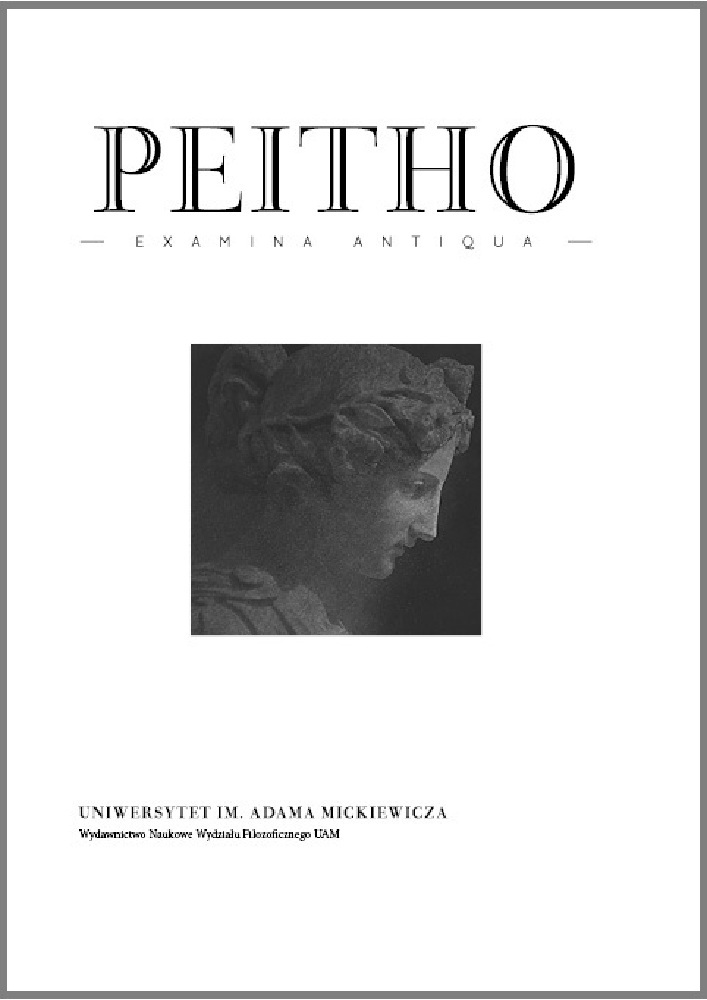Abstract
In this paper I examine the testimonium of Aristotle’s Rhetoric concerning Diogenes the Cynic (SSR V B 184). This piece of evidence is the most ancient source of Diogenes and proves that Aristotle was familiar with his writings. I also study the testimonium on Diogenes that is handed down by Theophrastus (SSR V B 172), which confirms the interest of the ancient Peripatos in this philosopher. Finally, I examine a passage of Book 1 of the Politics where Aristotle refers to the thesis on the abolition of money. I argue that such a thesis could be ascribed to Diogenes. In particular, I attempt to demonstrate that several theses of political philosophy put forward by Diogenes should be considered as constituting a polemical overthrow of the corresponding theses of Aristotle in Book 1 of his Politics.
References
Aubenque, P., 1963, Le Problème de l’être chez Aristote, Paris.
Barns, J., 1951, “A New Gnomologium”, Classical Quarterly 45, pp. 1–19.
Baroncelli, F., Lapini, W., 2001, “Ipparchia di Maronea, sorella di Metrocle cinico, sposa di Cratete tebano, e il perfido Teodoro”, Maia 53, pp. 635–642.
Bartalucci, A., 1970–1971, “Una probabile ricostruzione dell’Eracle di Diogene di Sinope”, Studi Classici e Orientali 19–20, pp. 109–122.
Brancacci, A., 1985–1986, “La Théologie d’Antisthène”, Philosophia. Yearbook of the Academy of Athens 15–16, pp. 218–230.
Brancacci, A., 1993, “Erotique et théorie du plaisir chez Antisthène”, in: M.-O. Goulet-Cazé, R. Goulet (eds.), Le cynisme ancien et ses prolongements. Actes du colloque international du CNRS (Paris, 22–25 juillet 1991), Paris, pp. 35–55.
Brancacci, A., 2005, Antisthène. Le discours propre, Paris.
Brancacci, A., 2011, “Antistene e Socrate in una testimonianza di Filodemo (T 17 Acosta Méndez-Angeli)”, Cronache Ercolanesi 41, pp. 83–91.
Brancacci, A., 2013, “Introduzione al pensiero politico di Antistene”, in: F. De Luise, A. Stavru (eds.), Socratica III. Studies on Socrates, the Socratics, and the Ancient Socratic Literature, Sankt Augustin, pp. 29–40.
Criscuolo, U., 1970, “Cratete di Tebe e la tradizione cinica”, Maia 22, pp. 360–367.
Decleva Caizzi, F., 1966, Antisthenis fragmenta, Milano.
Decleva Caizzi, F., 1993, “L’elogio del cane. Sesto Empirico, Schizzi pirroniani 62–78”, Elenchos 14, pp. 305–330.
Dierauer, U., 1977, Tier und Mensch im Denken der Antike. Ideengeschichtliche Studien zur Tierpsychologie, Amsterdam.
Donzelli, G., 1960, “Una versione menippea della Διογένου πρᾶσις?”, Rivista di Filologia e di Istruzione Clas¬sica 88, pp. 225–276.
Dorandi, T., 1993, “La Politeia de Diogène de Sinope et quelques remarques sur sa pensée politique”, in: M.-O. Goulet-Cazé, R. Goulet (eds.), Le cynisme ancien et ses prolongements. Actes du colloque interna¬tional du CNRS (Paris, 22–25 juillet 1991), Paris, pp. 57–68.
Döring, I., 1995, “Diogenes und Antisthenes”, in: G. Giannantoni et alii (cur.), La tradizione socratica. Semi¬nario di studi, Napoli, pp. 125–150.
Dudley, D. R., 1937, A History of Cynicism from Diogenes to the VIth Century A.D., London.
Düring, I., 1966, Aristoteles, Heidelberg.
Gallo, I., 1980, Frammenti biografici da papiri, vol. II: La biografia dei filosofi, Roma.
Gastaldi, S. (cur.), 2014, Aristotele, Retorica, Roma.
Giannantoni, G., 1990, Socratis et Socraticorum reliquiae, vol. IV, Napoli.
Giannattasio Andria, R., 1980, “Diogene cinico nei papiri ercolanesi”, Cronache Ercolanesi 10, pp. 129–151.
Gomperz, T., 1903, Griechische Denker, Eine Geschichte der antiken Philosophie, Bd. III, Leipzig.
Goulet Cazé, M.-O., 1996, “Who was the First Dog?”, in: R. B. Branham, M.-O. Goulet Cazé (eds.), The Cynics. The Cynic Movement in Antiquity and Its Legacy, Berkeley–Los Angeles 1996, pp. 414–415.
Grote, G., 1888, Plato and the other Companions of Socrates. A New Edition, vol. III, London.
Höistad, R., 1948, Cynic Hero and Cynic King. Studies in the Cynic Conception of Man, Lund.
Husson, S., 2011, La République de Diogène. Une cité en quête de la nature, Paris.
Isnardi Parente, M., 1975, “Egualitarismo democratico nella sofistica?”, Rivista critica di storia della filosofia 30, 1975, pp. 3–26.
Isnardi Parente, M., 1983, “Il pensiero politico greco dalle origini alla sofistica”, in: L. Firpo (dir.), Storia delle idee politiche economiche e sociali, Vol. I: L’antichità classica, Torino, pp. 127–223.
Izzo, D., 2014, “Krates bei Plautus? Persa, 118–28”, Annali Online di Ferrara 9, pp. 76–99.
Lapini, W., 2003, Studi di filologia filosofica greca, Firenze.
Leo, F., 1906, “Diogenes bei Plautus”, Hermes 41, pp. 441–446 [anche in: F. Leo, Ausgewählte Kleine Schriften, E. Fränkel (hrsg.), Bd. I, Roma, pp. 185–190].
López Cruces, J. L., 2003, “Diógenes y sus tragedias a la luz de la comedia”, Itaca. Quadernes Catalans de Cultura Clàssica 19, pp. 47–69.
López Cruces, J. L., 2010, “Une tragédie perdue; l’Héraclès de Diogène le Cynique”, Les Etudes Classiques 78, pp. 3–24.
Moles, J., 1995, “The Cynics and politics”, in: A. Laks, M. Schofield (eds), Justice and Generosity. Studies in Hellenistic Social and Political Philosophy. Proceedings of the Sixth Symposium Hellenisticum, Cambridge, pp. 129–158.
Paradiso, A., 2014, “Ipparchia cinica: la trasgressione come sillogismo”, in: U. Bultrighini, E. Dimauro (cur.), Donne che contano nella storia greca, Lanciano, pp. 839–864.
Pasetti, L., 2011, “Intellettuali nel Persa? Il parassita, sua figlia e la ‘filosofia da commedia’”, in: R. Raffaelli, A. Tontini (cur.), Lecturae Plautinae Sarsinates XIV. Persa, Urbino, pp. 69–92.
Prince, S., 2015, Antisthenes of Athens. Text, Translations, and Commentary, Ann Arbor.
Roca Ferrer, J., 1974, “Kynikòs Tropos y los géneros literarios del helenismo”, Boletín del Instituto de Estudios Helénicos 8, pp. 163–193.
Sayre, F., 1938, Diogenes of Sinope. A Study of Greek Cynicism, Baltimore.
Schofield, M., 1991, The Stoic Idea of the City, Cambridge.
von Fritz, K., 1926, Quellen-Untersuchungen zu Leben und Philosophie des Diogenes von Sinope, Leipzig.
von Wilamowitz-Moellendorff, U., 1893, De tragicorum fragmentis commentatio, Göttingen [anche in: U. Von Wilamowitz-Moellendorff, Kleine Schriften, Bd. I, Berlin 1935, pp. 176–208].
Weber, E., 1887, “De Dione Crysostomo Cynicorum sectatore”, Leipziger Studien für classischen Philologie 10, pp. 77–268.
Zaccaria, P., 2017, “The First Dog: Diogenes (Aristot. Rhet. 3,10,1411a24–25)”, Hermes 145, pp. 364–370.
License
Peitho provides immediate open access to its content on the principle that making research freely available to the public supports a greater global exchange of knowledge.
